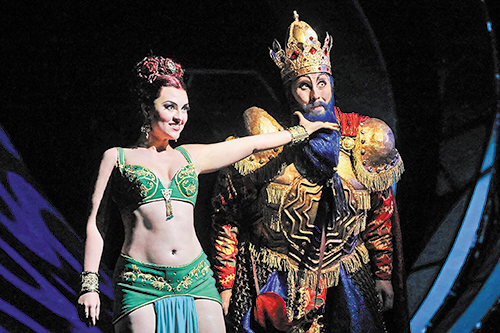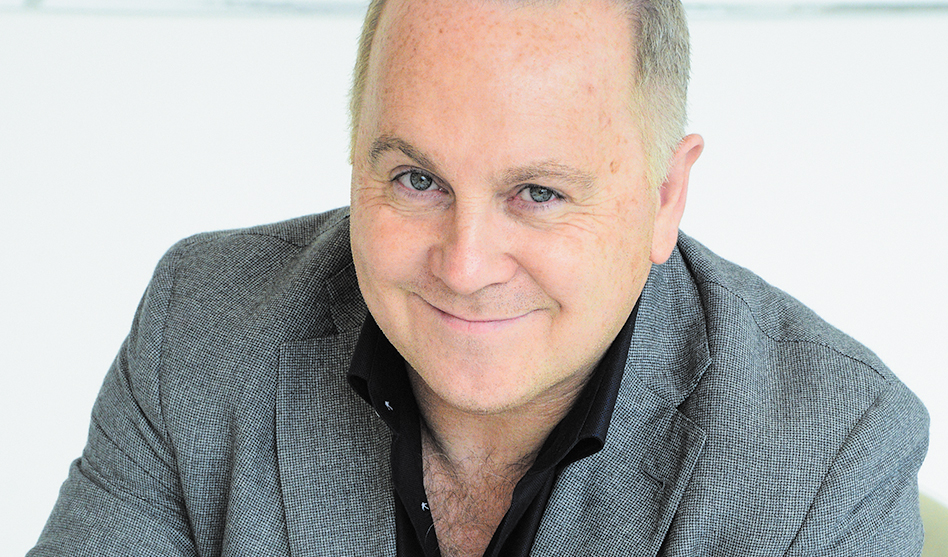Gay stage director Paul Curran plumbs the political and social underpinnings of the comic fairy tale ‘The Golden Cockerel,’ as relevant today as a century ago
ARNOLD WAYNE JONES | Executive Editor
jones@dallasvoice.com
 Paul Curran remembers the first — and only — time he directed an opera in a language he didn’t know. It was Foerster’s Eva, with a Czech libretto, and while he understood enough to get by, he swore from then on, he would only direct a show written in a language in which he is fluent.
Paul Curran remembers the first — and only — time he directed an opera in a language he didn’t know. It was Foerster’s Eva, with a Czech libretto, and while he understood enough to get by, he swore from then on, he would only direct a show written in a language in which he is fluent.
Not that that requirement has proven a hindrance to his career advancement. A true polyglot, Curran speaks nine languages, including Russian … which is what led him to take on Rimsky-Korsakov’s comic masterpiece The Golden Cockerel for the Dallas Opera’s historic 10th season at the Winspear.
This isn’t Curran’s first time with The Golden Cockerel; in fact, the current version is his adaptation of a staging he did for the Santa Fe Opera in 2017. But with each experience, Curran finds new avenues to explore.
“It’s always exciting coming back to it — it’s a great luxury and joy, especially with new singers. I love coming back to this,” he says. During recent rehearsals, one of his stars — who has performed the opera many times — gave him a great compliment about his devotion to analyzing the text: “I feel as if it’s new to me.” That means they are doing something right, he says… and staying true to the vision of the piece.
“The text of this opera is perhaps the most extraordinary I’ve ever come across because of its political and sexual content,” he says. Although an opera buffa with a fairy-tale plot, The Golden Cockerel’s reputation as a lightning rod for controversy dates to its origins.
“No fairy tale was written for the entertainment of children — that’s nonsense,” Curran says. “They were written as parables of modern life. I don’t think there’s any great theater piece that wasn’t making a political comment on their present situation.”
Pushkin wrote the original short story (after a Washington Irving poem) in 1834 as a critique of the militaristic Nicholas I. (Pushkin was exiled in part for its content.) Rimsky-Korsakov — who had announced his retirement in 1905 — decided to compose the operatic adaptation in 1906 in reaction to Nicholas II and the entire czarist regime. (The opera was almost immediately banned in Russia.)
Both story and opera are political satires about a lazy, fat potentate who cannot be bothered with the nuances of statecraft. He leads his country into a needless war with a perceived threat on the Southern border. Oh, and he has idiot children with whom he foolishly entrusts functions of government.
“Here is a czar who wants to do nothing followed by a counsel of sycophants and two sons, one more stupid than the other, who give dreadful advice,” Curran says in a mischievous Scottish brogue. “Sound familiar? … Of course you have a parallel [to our current political climate]. What I don’t believe is ramming it down people’s throats. You’re watching a fairy tale and think, wait a minute, this rings a bell. A piece like this is cyclical — it reminds us that history does keep repeating itself.”
Indeed, it’s the cultural references inherent in great works of literature that compel Curran to have an intimate understanding of the language in order to do his job properly.
 “Directing is about the much larger picture,” he says. “There is a grammar, a syntax [in all foreign languages] that is very different than English. We have to stop anglicizing things. You need to understand why the librettist and composer have written it in a certain way, why certain phrases are being used.”
“Directing is about the much larger picture,” he says. “There is a grammar, a syntax [in all foreign languages] that is very different than English. We have to stop anglicizing things. You need to understand why the librettist and composer have written it in a certain way, why certain phrases are being used.”
“The big picture” seems baked into his bones. Curran started out studying ballet in London and Helsinki — in fact, it’s where he first learned Russian. (“My teacher was Russian, and once you’ve heard ‘pick up your fat Scottish ass!’ for the third time in the language, you learn it … especially when accompanied by throwing a chair across the room,” he says.) He later attended drama school in Australia (graduating in the same class as Cate Blanchett), then landed his first big professional job: assisting a new, up-and-coming director named Baz Luhrmann.
“I was quite arrogant about it — when Baz asked me to assist him, I told him I’d think about it,” he laughs. Eventually, he said yes, and forged his own reputation; he was the director of the Norwegian National Opera for five years, and now is in-demand directing opera all over the world. (He previously helmed the world premiere of Becoming Santa Claus for Dallas Opera in 2015.)
Because of his facility with languages, Curran has focused his career on opera, but his approach to all stage work is the same. “Here’s an advertisement: Paul would love to do another play,” he jokes. “The real difference between operas or musicals and straight theater is, in plays you get to create your own music because of the text, but in opera you’re given music to interpret. It’s a difference, but it’s not much of a difference.”
What does matter, however is, working with a good conductor, and he has nothing but praise for Dallas Opera music director Emmanuel Villaume.
“One of the joys in working with Emmanuel is his preparation and his knowledge and sophistication. He’ll always bring a philosophical/historical idea to any show we’re doing together. Emmanuel is the antithesis of the ‘maestro myth’ — he really is a man of great musical theater. Dallas is damned lucky to have him.”
Curran finds that magical combination of factors — cast, company, context — the secret to making his job worth doing.
“I would never direct a show unless I saw a reason for someone to spend money and time to see it,” Curran says. “It can’t be just entertainment — or, just as bad, intellectual masturbation. There has to be something more.”
















